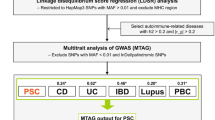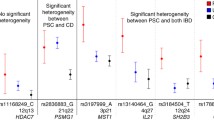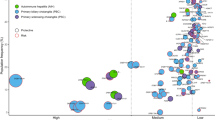Abstract
Background
Primary sclerosing cholangitis (PSC) is a kind of cholestatic liver disease without effective therapies and its pathogenesis is largely unknown.
Methods
We performed the proteome-wide Mendelian randomization (MR) design to estimate the causal associations of protein levels with PSC risk. Therein, genetic associations with 4,907 plasma protein levels were extracted from a proteome-wide genome-wide association study (GWAS) with 35,559 individuals and those with PSC were obtained from the International PSC Study Group (2,871 cases and 12,019 controls) and the FinnGen study (1,491 cases and 301,383 controls). The colocalization analysis was performed to detect causal variants shared by proteins and PSC. The identified proteins were further enriched in pathways and diseases. A phenome-wide association screening was performed and potential drugs were assessed as well.
Results
The results indicated that genetically predicted plasma levels of 14 proteins were positively associated with an increased risk of PSC and 8 proteins were inversely associated with PSC risk in both PSC GWAS data sets, and they all survived in sensitivity analyses. The colocalization indicated that AIF1 (allograft inflammatory factor 1) and HLA-DQA2 (major histocompatibility complex, class II, DQ alpha 2) were shared proteins with PSC, and they should be direct targets for PSC. The phenome-wide screening suggested that variants located at AIF1 or HLA-DQA2 region were closely associated with several autoimmune diseases, such as rheumatoid arthritis, implicating the shared pathogenesis among them.
Conclusions
Our study highly pinpointed two candidate targets (AIF1 and HLA-DQA2) for PSC.
Graphical abstract






Similar content being viewed by others
Availability of data and materials
The SNP–protein associations can be accessed via https://www.decode.com/summarydata/. The SNP–PSC associations can be accessed via https://www.ebi.ac.uk/gwas/ and https://www.finngen.fi/en.
Abbreviations
- PSC:
-
Primary sclerosing cholangitis
- MR:
-
Mendelian randomization
- GWAS:
-
Genome-wide association study
- AIF1 :
-
Allograft inflammatory factor 1
- HLA-DQA2 :
-
Major histocompatibility complex, class II, DQ alpha 2
- UDCA:
-
Ursodeoxycholic acid
- HLA:
-
Human leukocyte antigen
- PBC:
-
Primary biliary cholangitis
- IBD:
-
Inflammatory bowel disease
- SNP:
-
Single nucleotide polymorphism
- pQTL:
-
Protein quantitative trait locus
- IV:
-
Instrumental variable
- PC:
-
Principal components
- SMR:
-
Summary-data-based Mendelian randomization
- OR:
-
Odds ratio
- HEIDI:
-
Heterogeneity in dependent instrument
- FDR:
-
False discovery rate
- PP:
-
Posterior probability
- LD:
-
Linkage disequilibrium
- IGF2R :
-
Insulin-like growth factor 2 receptor
- TNFRSF1B :
-
Tumor necrosis factor receptor superfamily, member 1B
- ICOSLG :
-
Inducible T-cell co-stimulator ligand
- EPHA2 :
-
Ephrin type-A receptor 2
- MFGE8 :
-
Milk fat globule EGF and factor V/VIII domain containing
References
Dyson JK, Beuers U, Jones DEJ, Lohse AW, Hudson M. Primary sclerosing cholangitis. Lancet. 2018;391:2547–2559
Hasegawa S, Yoneda M, Kurita Y, Nogami A, Honda Y, Hosono K, et al. Cholestatic liver disease: current treatment strategies and new therapeutic agents. Drugs. 2021;81:1181–1192
Visseren T, Erler NS, Polak WG, Adam R, Karam V, Vondran FWR, et al. Recurrence of primary sclerosing cholangitis after liver transplantation—analysing the European Liver Transplant Registry and beyond. Transpl Int. 2021;34:1455–1467
Melum E, Franke A, Schramm C, Weismüller TJ, Gotthardt DN, Offner FA, et al. Genome-wide association analysis in primary sclerosing cholangitis identifies two non-HLA susceptibility loci. Nat Genet. 2011;43:17–19
Ji SG, Juran BD, Mucha S, Folseraas T, Jostins L, Melum E, et al. Genome-wide association study of primary sclerosing cholangitis identifies new risk loci and quantifies the genetic relationship with inflammatory bowel disease. Nat Genet. 2017;49:269–273
Burgess S, Mason AM, Grant AJ, Slob EAW, Gkatzionis A, Zuber V, et al. Using genetic association data to guide drug discovery and development: review of methods and applications. Am J Hum Genet. 2023;110:195–214
Yang H, Chen L, Liu Y. A large-scale plasma proteome Mendelian randomization study identifies novel causal plasma proteins related to primary biliary cholangitis. Front Immunol. 2023;14:1052616
Chen J, Xu F, Ruan X, Sun J, Zhang Y, Zhang H, et al. Therapeutic targets for inflammatory bowel disease: proteome-wide Mendelian randomization and colocalization analyses. EBioMedicine. 2023;89: 104494
Ferkingstad E, Sulem P, Atlason BA, Sveinbjornsson G, Magnusson MI, Styrmisdottir EL, et al. Large-scale integration of the plasma proteome with genetics and disease. Nat Genet. 2021;53:1712–1721
Zhu Z, Zhang F, Hu H, Bakshi A, Robinson MR, Powell JE, et al. Integration of summary data from GWAS and eQTL studies predicts complex trait gene targets. Nat Genet. 2016;48:481–487
Giambartolomei C, Vukcevic D, Schadt EE, Franke L, Hingorani AD, Wallace C, et al. Bayesian test for colocalisation between pairs of genetic association studies using summary statistics. PLoS Genet. 2014;10: e1004383
Pazoki R, Vujkovic M, Elliott J, Evangelou E, Gill D, Ghanbari M, et al. Genetic analysis in European ancestry individuals identifies 517 loci associated with liver enzymes. Nat Commun. 2021;12:2579
Han Y, Byun J, Zhu C, Sun R, Roh JY, Cordell HJ, et al. Multitrait genome-wide analyses identify new susceptibility loci and candidate drugs to primary sclerosing cholangitis. Nat Commun. 2023;14:1069
Turley P, Walters RK, Maghzian O, Okbay A, Lee JJ, Fontana MA, et al. Multi-trait analysis of genome-wide association summary statistics using MTAG. Nat Genet. 2018;50:229–237
Julià A, Domènech E, Ricart E, Tortosa R, García-Sánchez V, Gisbert JP, et al. A genome-wide association study on a southern European population identifies a new Crohn’s disease susceptibility locus at RBX1-EP300. Gut. 2013;62:1440–1445
Román ID, Cano-Martínez D, Lobo MV, Fernández-Moreno MD, Hernández-Breijo B, Sacristán S, et al. Infliximab therapy reverses the increase of allograft inflammatory factor-1 in serum and colonic mucosa of rats with inflammatory bowel disease. Biomarkers. 2017;22:133–144
Elizondo DM, Brandy NZ, da Silva RL, de Moura TR, Lipscomb MW. Allograft inflammatory factor-1 in myeloid cells drives autoimmunity in type 1 diabetes. JCI Insight. 2020;5(10):e136092
Chinnasamy P, Lutz SE, Riascos-Bernal DF, Jeganathan V, Casimiro I, Brosnan CF, et al. Loss of allograft inflammatory factor-1 ameliorates experimental autoimmune encephalomyelitis by limiting encephalitogenic CD4 T-cell expansion. Mol Med. 2015;21:233–241
Peres DS, Theisen MC, Fialho MFP, Dalenogare DP, Rodrigues P, Kudsi SQ, et al. TRPA1 involvement in depression- and anxiety-like behaviors in a progressive multiple sclerosis model in mice. Brain Res Bull. 2021;175:1–15
Churchill MJ, Cantu MA, Kasanga EA, Moore C, Salvatore MF, Meshul CK. Glatiramer acetate reverses motor dysfunction and the decrease in tyrosine hydroxylase levels in a mouse model of Parkinson’s disease. Neuroscience. 2019;414:8–27
Cao F, Souders Ii CL, Perez-Rodriguez V, Martyniuk CJ. Elucidating conserved transcriptional networks underlying pesticide exposure and Parkinson’s disease: a focus on chemicals of epidemiological relevance. Front Genet. 2018;9:701
Tong M, Dong M, de la Monte SM. Brain insulin-like growth factor and neurotrophin resistance in Parkinson’s disease and dementia with Lewy bodies: potential role of manganese neurotoxicity. J Alzheimers Dis. 2009;16:585–599
Liu JZ, Hov JR, Folseraas T, Ellinghaus E, Rushbrook SM, Doncheva NT, et al. Dense genotyping of immune-related disease regions identifies nine new risk loci for primary sclerosing cholangitis. Nat Genet. 2013;45:670–675
Hong SN, Park C, Park SJ, Lee CK, Ye BD, Kim YS, et al. Deep resequencing of 131 Crohn’s disease associated genes in pooled DNA confirmed three reported variants and identified eight novel variants. Gut. 2016;65:788–796
Alarcón-Riquelme ME, Ziegler JT, Molineros J, Howard TD, Moreno-Estrada A, Sánchez-Rodríguez E, et al. Genome-wide association study in an amerindian ancestry population reveals novel systemic lupus erythematosus risk loci and the role of european admixture. Arthritis Rheumatol. 2016;68:932–943
Schutt C, Mirizio E, Salgado C, Reyes-Mugica M, Wang X, Chen W, et al. Transcriptomic evaluation of juvenile localized scleroderma skin with histologic and clinical correlation. Arthritis Rheumatol. 2021;73:1921–1930
Wang M, Wu J, Lei S, Mo X. Genome-wide identification of RNA modification-related single nucleotide polymorphisms associated with rheumatoid arthritis. BMC Genomics. 2023;24:153
Hafler DA, Compston A, Sawcer S, Lander ES, Daly MJ, De Jager PL, et al. Risk alleles for multiple sclerosis identified by a genomewide study. N Engl J Med. 2007;357:851–862
Punia S, Juran BD, Ali AH, Schlicht EM, Moore RM, Sun Z, et al. Evaluation of circulating cell-free DNA in cholestatic liver disease using liver-specific methylation markers. BMC Gastroenterol. 2021;21:149
Ponnuraj EM, Hayward AR. Requirement for TNF-Tnfrsf1 signalling for sclerosing cholangitis in mice chronically infected by Cryptosporidium parvum. Clin Exp Immunol. 2002;128:416–420
Hedl M, Lahiri A, Ning K, Cho JH, Abraham C. Pattern recognition receptor signaling in human dendritic cells is enhanced by ICOS ligand and modulated by the Crohn’s disease ICOSLG risk allele. Immunity. 2014;40:734–746
Arthur B, Fouad L (2023) Risk factors of primary liver cancer initiation associated with tumour initiating cell emergence: novel targets for promising preventive therapies. eGastroenterology 1:e100010
Coulthard MG, Morgan M, Woodruff TM, Arumugam TV, Taylor SM, Carpenter TC, et al. Eph/Ephrin signaling in injury and inflammation. Am J Pathol. 2012;181:1493–1503
Can G, Ayvaz S, Can H, Demirtas S, Aksit H, Yilmaz B, et al. The Syk inhibitor fostamatinib decreases the severity of colonic mucosal damage in a rodent model of colitis. J Crohns Colitis. 2015;9:907–917
Zhang Y, Brenner M, Yang WL, Wang P. Recombinant human MFG-E8 ameliorates colon damage in DSS- and TNBS-induced colitis in mice. Lab Invest. 2015;95:480–490
Acknowledgements
We would like to thank all investigators contributing to the publicly available summary statistics.
Funding
The work is supported by the Natural Science Foundation of China (82241223, U20A20360).
Author information
Authors and Affiliations
Contributions
GL and LC proposed and designed the research. LC undertook data collection and performed the main data analysis. LC wrote the draft of the manuscript. YZ supervised the statistical analysis and revised the manuscript. ML visualized the results and revised the manuscript. GL supervised the whole research and claimed the integrity of data analysis.
Corresponding author
Ethics declarations
Conflict of interest
Lanlan Chen, Yuexuan Zhao, Mingyue Li, Guoyue Lv declared that no potential conflicts of interest should be disclosed in this study.
Ethical approval
Each study has been approved by its corresponding Ethical Review Committee.
Consent to participate
The public data can be accessed without restriction if not attempting to identify individual-level information.
Consent for publication
Each author has given his/her consent to publication.
Additional information
Publisher's Note
Springer Nature remains neutral with regard to jurisdictional claims in published maps and institutional affiliations.
Supplementary Information
Below is the link to the electronic supplementary material.
Rights and permissions
Springer Nature or its licensor (e.g. a society or other partner) holds exclusive rights to this article under a publishing agreement with the author(s) or other rightsholder(s); author self-archiving of the accepted manuscript version of this article is solely governed by the terms of such publishing agreement and applicable law.
About this article
Cite this article
Chen, L., Zhao, Y., Li, M. et al. Proteome-wide Mendelian randomization highlights AIF1 and HLA-DQA2 as targets for primary sclerosing cholangitis. Hepatol Int 18, 517–528 (2024). https://doi.org/10.1007/s12072-023-10608-8
Received:
Accepted:
Published:
Issue Date:
DOI: https://doi.org/10.1007/s12072-023-10608-8




